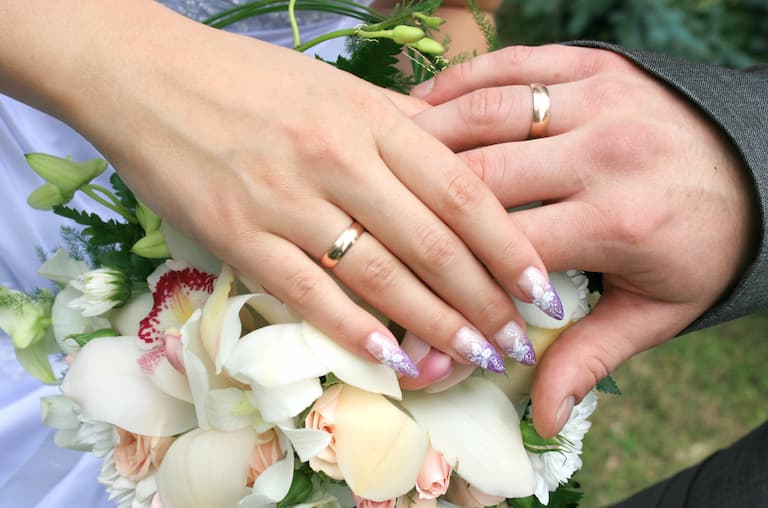While it’s a well-known fact that almost half of all marriages end in divorce or separation. While some relationship experts see no issue with a person having gone through multiple divorces, others might consider it a moral failing. However, as your dating pool grows older, is being divorced twice a red flag?
Being divorced twice can sometimes be considered a red flag, but not always. How long between divorces, how long since the 2nd divorce, and whether the individual has invested time and effort in healing properly and owning their role in the divorces determines whether it is truly a red flag.
(source)
The perception of the phenomenon varies widely. You can overcome being divorced twice by reflecting, finding closure, setting fair expectations, prioritizing your well-being, and keeping an open mind.
In this article, I’ll explain why being divorced might be considered a red flag in more detail. Additionally, I’ll take you through some tips and techniques on how to overcome the stigma of the two-time divorcee.

Why Is Being Divorced Twice Considered a Red Flag?
When it comes to determining whether being divorced twice should be considered a red flag, relationship experts hold differing opinions.
While some might link multiple failed marriages to personality traits related to emotional health shortcomings, others believe it to be “absurdly judgmental” to assume anything about a person’s mental or emotional well-being based on the success of their previous marriages. After all, it takes two to tango.
However, in my opinion, it was Dr. Gail Saltz who described the phenomenon best; there isn’t a one size fits all approach when it comes to answering this question.
Individuals get married and divorced for many reasons. While sometimes multiple divorces can be caused by one’s judgment or moral failings, it isn’t too far-fetched to assume that sometimes it’s just a matter of coincidence or bad luck.
Still, while relationship experts are often able to see through the stigma of a two-time divorcee and understand the underlying nuances, the general public mightn’t be as well-equipped. People might also be unwilling to leave their judgments behind. As a result, being divorced twice is often considered a red flag.
Being divorced twice is sometimes considered a red flag because the phenomenon gets attributed to one’s judgment or moral failings. However, in reality, the circumstance is much more nuanced than this, which is why with time, many people have moved on from their preconceived notions.
I wish to reiterate: that whether being a two-time divorcee is a red flag or not will heavily depend on an individual’s personality traits and circumstances. For example, you can’t really compare a serial cheater or abuser with a person who’s finally breaking out of a pattern of abusive relationships.
Additionally, timelines matter.
Someone getting married and divorced twice within five years might indicate some issues regarding their quality of judgment. Conversely, someone with a failed marriage in their teens/early adult years and then gets divorced after a decade-long partnership, later on, might simply be a victim of bad luck.
For example, I got married the 1st time in 1985. Divorced 9 years later (my choice) and then didn’t get married again until 2006. That marriage then ended in 2021.
But I’m not sure the 3rd time’s the charm.
Therefore, before jumping to any conclusions, I’d recommend searching for red flags on your potential partner’s personality, just like you would if you were dating a never-married individual. Avoid relying on outdated preconceived notions.
However, if the phenomenon still rings some alarm bells, try to be extra vigilant about any potential shortcomings. Alternatively, take your time and progress the relationship at a slower pace.
How To Overcome Being Divorced Twice
The external judgment is only part of the hardship that comes with being a two-time divorcee.
Sometimes, most of the worries and stigma stem from within. It can be challenging to accept the reality of two failed marriages while maintaining hope for a long-lasting relationship in the future.

However, I’m here to assure you that overcoming being divorced twice is entirely possible, albeit not as easy as you might’ve hoped. The process might take a lot of self-reflection and personal improvement, but at the end of the day, you’re guaranteed to come out a better person and potential partner.
1. Reflect on Your Strengths and Weaknesses
The best way to healthily move on from any relationship is to reflect on your strengths and weaknesses as a partner.
As a two-time divorcee, it’s even more important to treat your past marriages as learning experiences from which you can gain insight and make improvements. Going through this (often transformative) learning curve is what’s going to give you a possible shot at a future healthy relationship.
Even though humans often don’t like to think of themselves as predictable, their behaviors usually follow an established pattern. Therefore, try to connect the dots between your past marriages to work out which of your behavior patterns might have influenced their ending.
However, reflecting doesn’t mean putting yourself down or burdening yourself with faults that weren’t yours. When reflecting on your past arguments and mistakes, think of the situation as if a friend was telling you the story. Doing so will help you view the experience much more objectively.
The most important step you can take to overcome being divorced twice is to better understand your patterns and the reasons behind your unsuccessful marriages. Do this before jumping into a new relationship.
Keep in mind that not all great relationships lead to a happy marriage, as what we tend to look for in a spouse can widely differ from what we look for in a girlfriend or boyfriend.
Marriage tends to amplify even the most minor disagreements. Therefore, excellent communication skills are at the forefront of what makes such a significant commitment succeed.
So, when reflecting, it’s essential to think back to the first signs of conflict, what ignited them, and what you would’ve done differently.
Even though the process might feel excruciating at times, going through it is the only way to optimize your chances of a future long-lasting relationship.
2. Find Closure Before Moving On
Unresolved issues from a past marriage will always introduce themselves in any new relationship you get into – as long as they remain unaddressed. No matter how hurt or moved on you feel, finding genuine closure will help you leave your baggage in the past instead of letting it weigh down your future.
Every time you avoid dealing with an issue or an unpleasant feeling, I guarantee you it’ll just become more prominent with time. Actively fostering any type of emotion toward your ex-spouse will never allow you to move on properly.
Finding closure is easier said than done, especially when it comes to physically or mentally abusive relationships that leave you scarred for life. However, it’s still better to take the time you need to fully heal before investing yourself in another person.
Hence, instead of sweeping your issues and feelings under the rug, commit to deal with them head-on in an effort to resolve them – no matter how much time the process might take.
If you’re still on talking terms with one or both of your exes, working together toward reaching closure may significantly help you along with the experience.
Try to come to a mutual understanding of what went wrong in the relationship, and make sure to set clear expectations of what your platonic relationship will entail from now on. This is especially important to establish if you share one or more children.

3. Set Fair Expectations
When you feel ready to re-enter the dating pool, you need to first set clear, fair expectations on what you expect from your future partner. Being direct about your past and future intentions will take you a long way in today’s dating scene.
As I’ve already established, two failed marriages can occur for a number of reasons and to almost anyone. So, don’t think less of yourself when trying to get back out there. You still deserve to find the care, love, and respect you were looking for in your 20s.
However, being fair with the expectations you set is essential too. Sometimes it’s easy for us to justify our own experiences while judging those of others. Therefore, make an effort to get to know people before jumping to conclusions regarding their personality or moral values.
While compromising is crucial in any relationship, it’s just as important not to budge when it comes to your basic requirements and expectations. Trying to convince yourself to fundamentally change for another person or getting into a relationship hoping they will, is futile and will only foster a growing resentment.
Therefore, set fair expectations and communicate them clearly to any potential romantic interest.
Doing so can save you from a lot of arguments and heartache in the long run. Love in itself isn’t enough to take you through years of companionship; communication and compatibility will.
Thus, before jumping into a new relationship, try to take a bit of control over your fate and make sure you and your potential partner’s long-term goals and expectations match. Even though it’s hard, try not to let your emotions take over the process; this is what so often ultimately leads to heartbreak.
4. Prioritize Your Well-being
I know the expression “work on yourself before entering a relationship” might seem a bit of a cliché. However, there’s a reason why both individuals and relationship experts keep repeating it as the golden rule to romantic success.
Before entering a new relationship, I highly recommend working on your own physical, mental, and emotional well-being first. If you want your next relationship to have even the slightest chance of success, you should ensure you’re in a stable place before making any decision that might make bouncing back even more difficult.
Being alone after decades of companionship can often feel intimidating.
However, I highly urge you to take all the necessary time required for you to feel comfortable with yourself and your romantic past. As long as you keep fostering negative feelings towards your experiences, you’ll never be able to learn or grow from them.
Additionally, give yourself the space you need to recover. Make time for solo activities that you wouldn’t otherwise be able to indulge in. Ideally, you’ll want to take that sense of individuality and independence into your next relationship as well.
Even though reflecting can be crucial throughout this process, try to avoid obsessing over minuscule details or panicking over your potential future relationships. Instead, utilize this time to better yourself through activities that stimulate you both physically and mentally.
Romantic fulfillment requires feeling content and secure within yourself first.

5. Keep an Open Mind
While being a two-time divorcee isn’t necessarily a red flag, being a jaded, cynical one definitely is. It’s understandable that your understanding and expectations of romantic love might shift after two failed marriages. However, I assure you that closing off won’t serve you in any way.
Overcoming this type of experience doesn’t necessarily mean finding (or trying to find) a long-lasting love. Additionally, keeping an open mind doesn’t mean considering every person you come across as a potential partner.
Keeping an open mind means accepting the possibility that what happened was a result of coincidence or bad luck.
And that a strong relationship can be built once again should you ever choose to. Once you achieve this, you’ll feel a heavy burden coming off your shoulders, allowing you to improve the relationship you have with yourself and others.
Additionally, if a strong, long-lasting love happens to come your way, you’ll be able to make an informed decision on whether you want to pursue it – rather than letting it go as you hold on to old fears and grudges. And if you ultimately find your lifetime partner, well, that’s just an added bonus.

Final Thoughts
The issue of whether being divorced twice should be considered a red flag or not is a controversial one.
While experts are able to better understand the nuances and circumstances that might lead to such a phenomenon, most people are still inclined to hold on to judgment and old, preconceived notions.
However, the stigma of being a two-time divorcee is slowly wearing off as people become more practical regarding their views on romantic love. While overcoming the insecurities and judgment that come after two failed marriages might be a challenging feat, it’s far from impossible.
